Questions to ask whether you're leaving Facebook or not
And trust me, I still hate Facebook.
Somehow carrying all the energy of divorced dad and the energy of a teenage incel at once, Mark Zuckerberg announced last week that Meta would replace fact checkers with a crowd-sourced system (also known as no system). Worse still, he announced the algorithm would recommend more political content (also known as right wing and Zionist propaganda).
To this I’ll admit my response was - is that not already happening? For almost a decade I’ve suffered through reporting racism and misogyny and death and rape threats on Facebook. None have been upheld.
Not the guy with the photo of his infant daughter as a profile picture that said “I hope you choke to death on dicks while your kids watch” not the guy with the ‘I stand with Israel’ profile picture who said ‘I’d love to see you raped by Hamas’.
As far as I’m concerned, Facebook has never moderated or fact checked anything. I mean, I was reporting ten to twenty posts a day from 2020 to 2021 where people claimed Covid 19 could be cured by everything from deep massage to cucumber oil.
So, I have to say, the announcement just feels like the usual bullshit. I suppose I am deeply cynical as a chronically online person. I’ve never found a single platform - including this one - that moderates properly or attempts to stop disinformation.
Under capitalism, I have no faith in any social media or media platforms. But I do have faith in us regular folks.
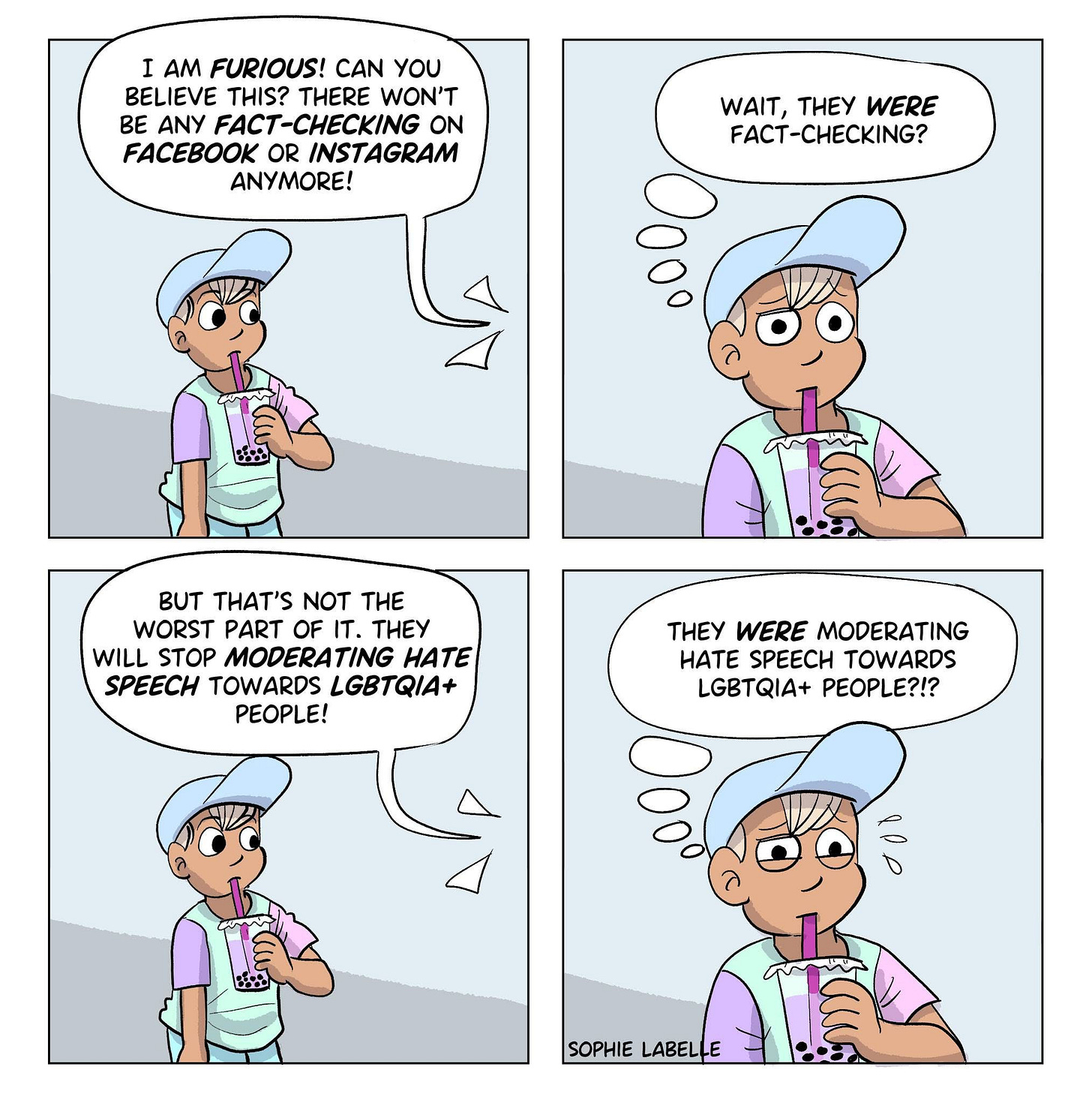
So, if you’re leaving - I don’t blame you and I’m not trying to convince you otherwise. There’s little reason to stay.
If you’re staying - I don’t blame you and I’m not trying to convince you otherwise. For better or worse, Facebook is my toxic workplace.
But I do have a few questions I think we should all ask ourselves whether we stay or go.
Where will I be getting information now?
There’s a quaint idea that legacy or traditional media is the best place to get information these days. Maybe there was a point when it was, but that ship sailed then sunk a long time ago. Wherever you get your information - you need to be recognising the biases behind the reporting.
For example, here - you’ll always know you’re getting the perspective of a ranty commie pinko feminist snowflake woke etc union-loving bleeding heart (far) leftist who truly believes in people power through community. That’s a given.
But if you read say The Post - you should recognise that they’re no more politically neutral than I am. I mean, they’re Wellington’s main media and they ran a non-bylined PR puff piece on their front page about their owner’s political lobby group.
I mean, they ran this (as the lead story) the night before submissions closed on the Treaty Principles Bill.
So, while we should despair at people getting all of their news through Facebook - we should also worry at those getting all of their news through any one source.
Ask yourself how widely you are reading. What are the biases behind what I’m reading? Who owns the media I’m consuming? What don’t I know? What is being hidden from me?
For example, without social media would you know about the experiences of medical progressionals in Gaza?
Would you know about Dr Thabat Saleem?
Would you know anything about what is happening in Gaza? What’s really happening?
How will I be part of community groups now?
Charities, community organisers and activists have long used Facebook and Instagram and social media platforms to bring people together to fight for a better world.
It’s not ideal. But there’s no ethically pure platform to use under capitalism. I have a number of groups on Facebook, some fluffy and some serious. One brings together parents of neurodivergent children to support their special interests.
Were I to leave Facebook, I’d need to think about whether I have the capacity to replicate this community offline. If you’re leaving Facebook and/or Instagram I think it’s worth considering what offline groups you can support - whether it’s your local library or your local time bank.
How will I support creators I appreciate?
Look, it’s a terrible time to be a creator. AI is trying to take our jobs and the cost-of-living crisis destroying everything. I don’t begrudge anyone leaving Facebook, it is a cesspit. But selfishly I do hope that the 40,000-odd people who follow my page choose to follow me here before they go.
I also hope it’s not like the great Substack move, where writers are harassed for not being ethically pure and leaving platforms that have Nazis on them. I spent at least six months feeling like I had that Clash song on a loop - should I stay or should I go now? - over the Substack anti-moderation, pro-disinformation issue.
I support anyone who left obviously! But I also support my family having a roof over their head. I tried to find ways around this - donating to me directly instead of through Substack - but it’s all very hard. And it’s hard when things are hard. A bit of empathy goes a long way.
So - consider who you actually like on Facebook and Instagram. Are they going to BlueSky (I’m not) or Mastodon (I’m not) or Taint (OK I made that last one up)? Can you follow them and support them somewhere else?
Can I identify rage bait and AI slop?
If you’re staying on Facebook or Instagram it’s crucial that you can identify rage bait and AI slop. If you’re leaving, it’s also crucial that you can identify rage bait or AI slop. Nothing has changed in that regard.
I started writing a piece about identifying rage bait last year - well before any talk of Zuck changing the algorithm. It’s always been a problem and it’s going to become much worse.
Rage-baiting or rage-farming is described as ‘the manipulative tactic of eliciting outrage with the goal of increasing internet traffic, online engagement, revenue and support’.
Let’s be clear - if you read an essay and it upsets you, that’s not rage bait. If you see an article from a reputable media organisation (yeah I know lol) that’s probably not rage bait. But - if a post has no suggestions for where you can put that anger so you can manage it? It’s probably bait.
This is the purpose of a rage bait post - to make a person upset, distressed and very angry. The person who is upset, distressed and very angry then shares it usually with a comment about how upset, distressed and angry they are.
And I know and understand this compulsion. Believe me, I’ve shared rage bait - I will share rage bait again even as I say to myself ‘never share rage bait!’. But, I cannot understand repeatedly sharing Brian Tamaki’s tiny hīkoi, when you have literally hundreds of thousands of images and videos of Hīkoi mō te Tiriti that are so inspiring and uplifting. Or sharing anything said by Andrew Tate. Or Sean Plunket. Or JK Rowling.
Rage bait exists outside of Instagram and Facebook. Whole media organisations are based around rage bait.
As for AI - we often think of the picture of Trump rescuing pets right?
Or any kid rescuing pets.
Or pets rescuing kids 😅
We should also be thinking about how when you see an RNZ story even mildly suggesting that Israel maybe shouldn’t shoot Palestinian children in the back of the head for existing you then see thousands of comments saying actually Israel has never (and will never) do anything wrong. If you click through to the profiles saying this, they will have AI generated images as profile pictures and little to no information. They’re bots.
Don’t let a comments section that’s 99% AI bots shape your beliefs. Talk to your kids about this, talk to them about how to spot bots, how to spot AI. Ask them to help you to spot AI if they’re better at it than you!
Finally, how will I engage with friends and family about issues that matter?
The beautiful thing about the terrible submissions process around the Treaty Principles Bill and Regulatory Standards Bill is that it has engaged people politically for the first time. So many people have told me that they made a submission for the first time and were delighted to see how easy it was.
At rallies and vigils for Palestine I have met people who have never attended a protest before. Seeing the raw footage out of Gaza of thousands of men, women and children murdered made them take a stand.
This is so important. As we face TikTok being banned we will hear that people are being radicalised online. Being radicalised is not a bad thing. You can be radicalised by seeing how someone you love is treated in the welfare system. You can be radicalised by seeing the lines outside of a food bank.
Not to stand on a table and sing Bread and Roses but we need to be radicalised. We need to see excuses made for climate crimes like the LA fires and be furious enough to demand arrests and accountability. We need to HAVE AN EMOTION when we see someone burning alive while hooked to an IV in Gaza. We need this to be human.
Without Facebook and Instagram how do you plan to share what’s important to you? How did you ask friends and family to make submissions? Did you attend submission parties? How will you support your efforts online or offline to help people find their power and stand up against injustice?
And I know it feels hopeless. But hopelessness is the enemy of progress. If it helps at all, I feel hopeful. The post on making submissions was viewed 45,000 times in a few days. It continues to have thousands of hits every day. People want to help each other.
I truly believe that. I don’t believe in social media platforms. I believe in us.




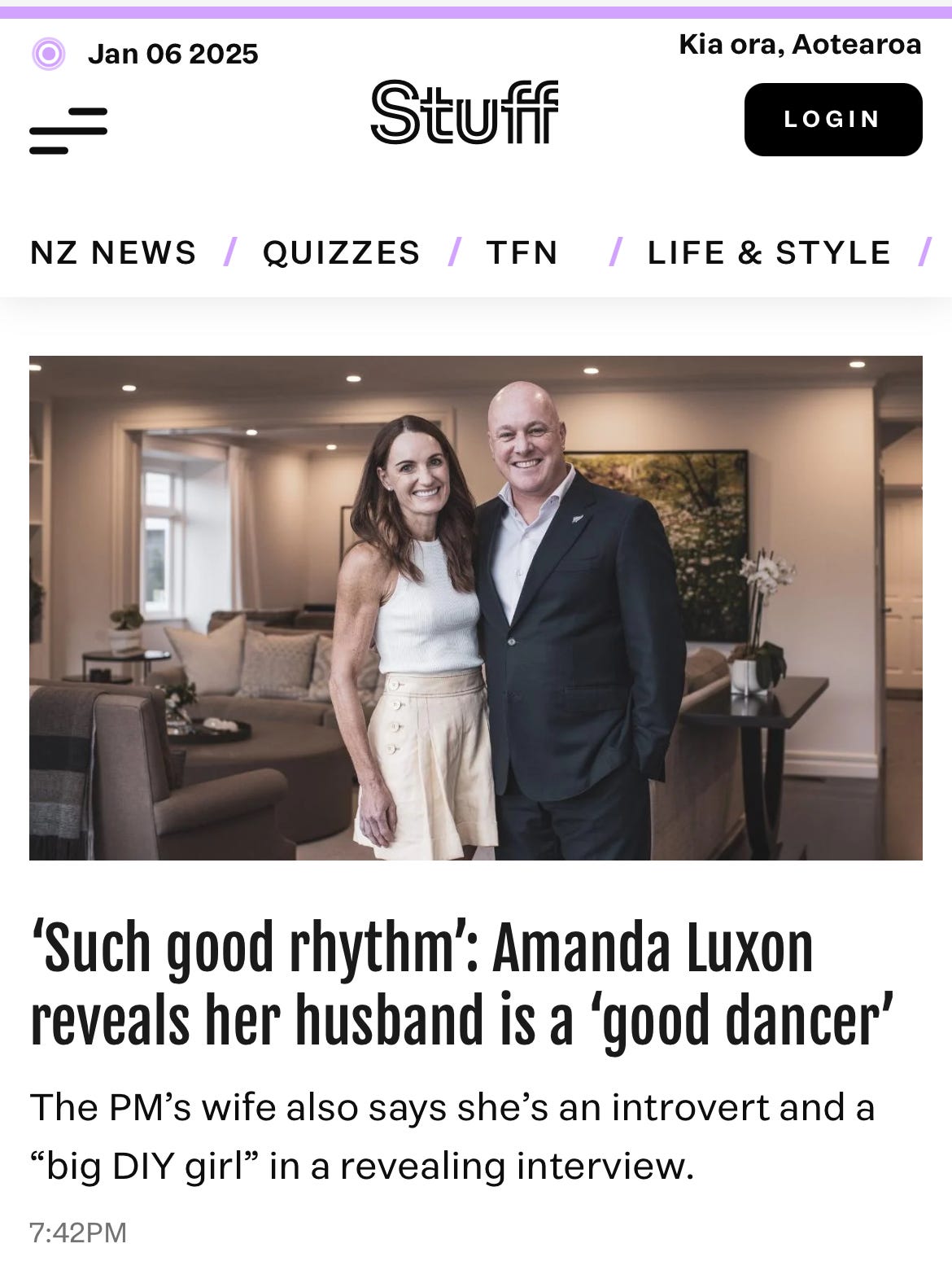
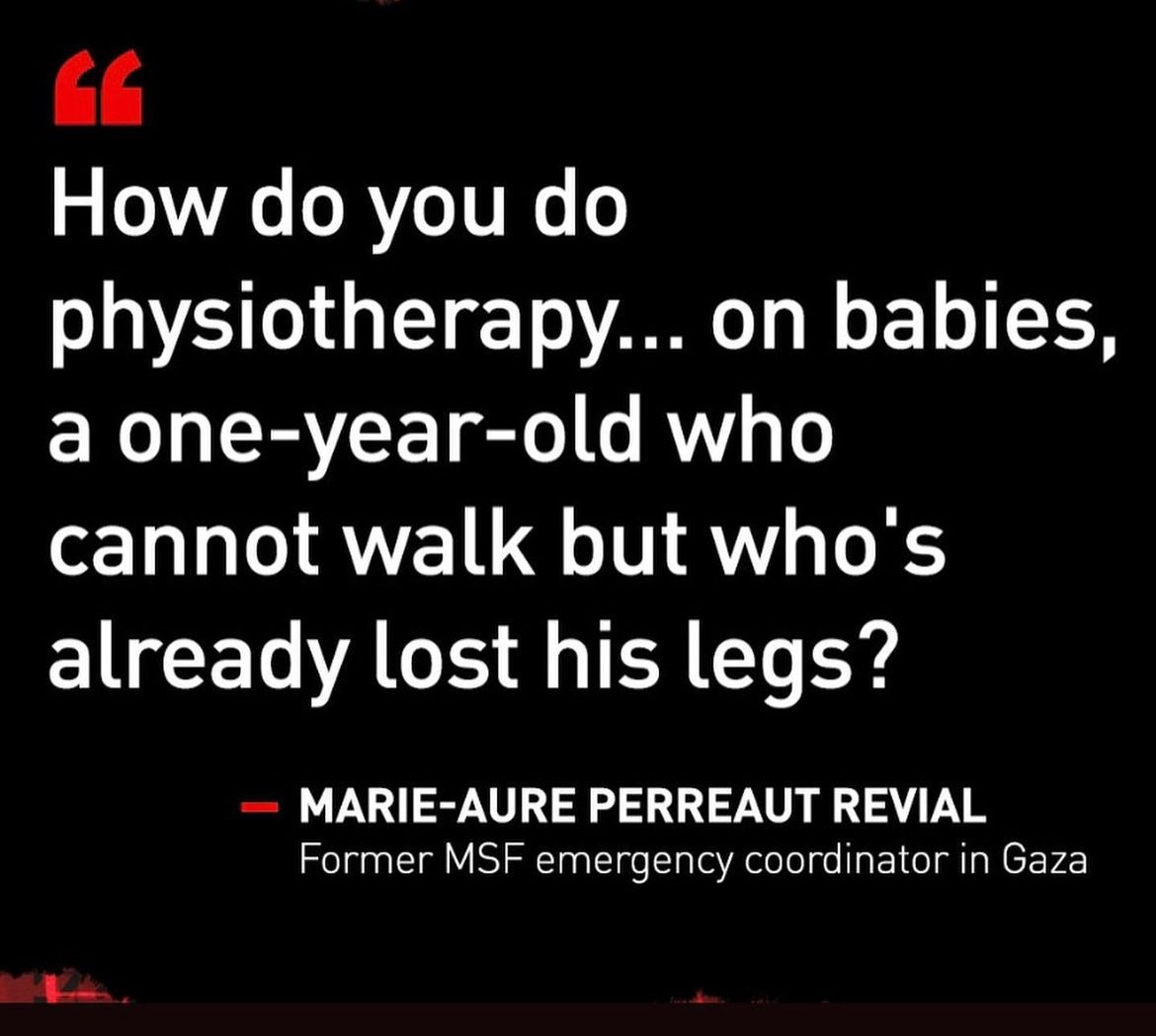



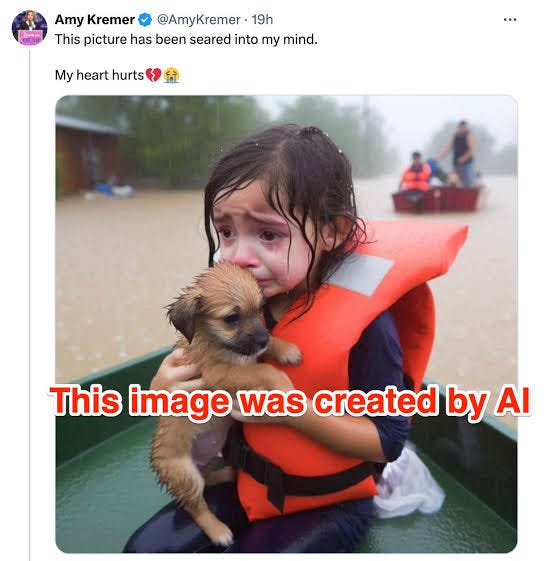

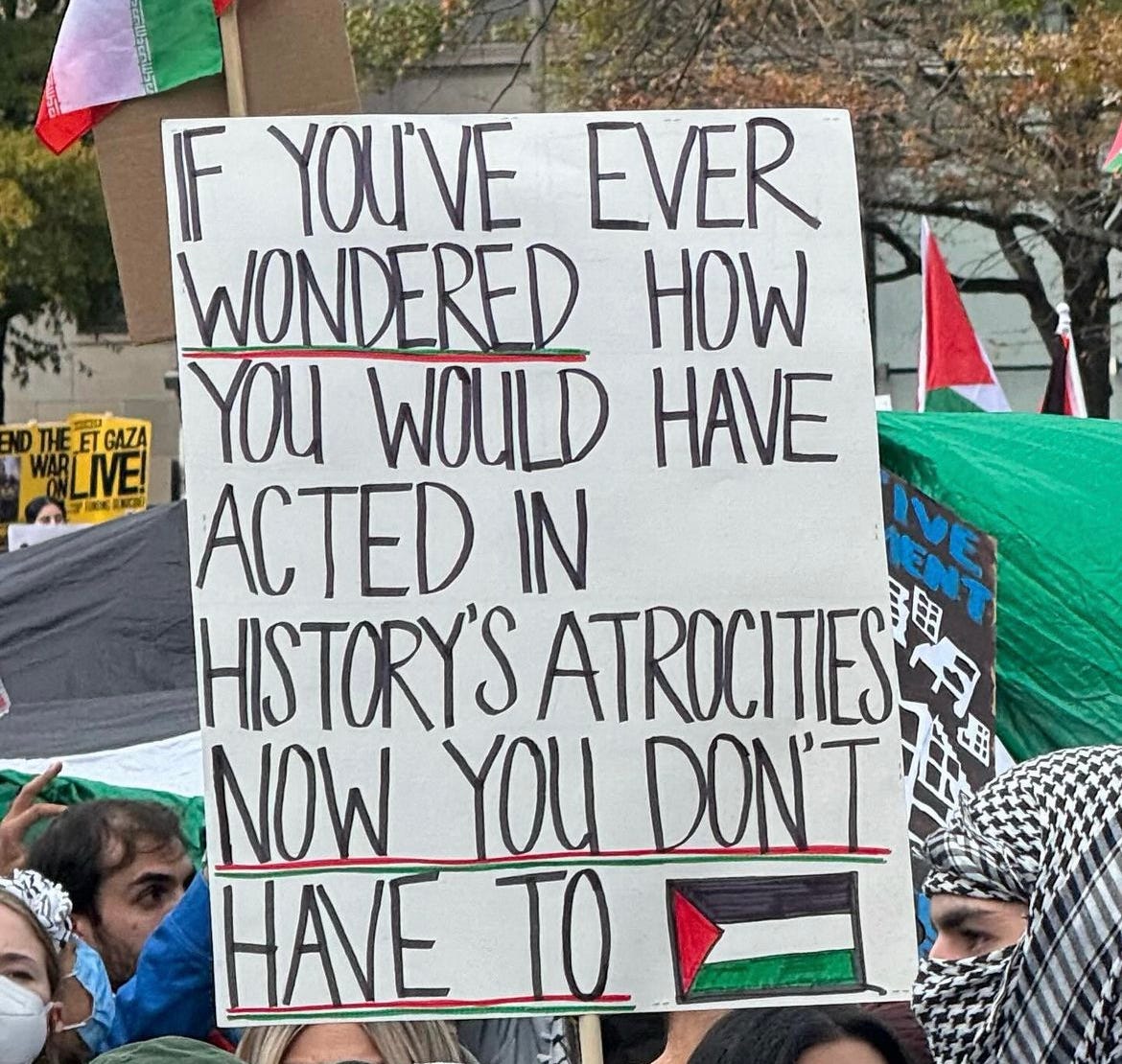
You’re doing fantastic work Emily and it’s fantastic to hear about the success of your submissions work.
I realise substack isn’t perfect, but I’ve found it the most nourishing of the online places I’ve used over the years, if only because of the way it allows us more tools to control comments, especially for paying subscribers. Thanks again.
As a parent of preschoolers, I've never been both so glad that my kids aren't online yet and at the same time so worried how much worse things could be by the time they are. As a teacher of senior primary age kids, I'm thinking about what I can do to help them learn this stuff and how to squeeze it into the day.